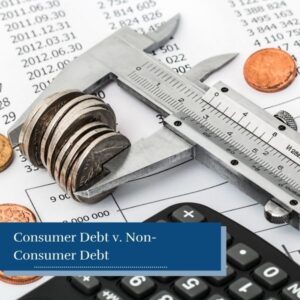Consumer Debt vs. Non Consumer Debt

Consumer Debt vs. Non-Consumer Debt
The major difference between consumer debt and non-consumer debt is what the money was used for. Whether your debt is considered consumer or non-consumer can affect your bankruptcy proceedings.
Everyone’s situation is different, but an attorney can review your case and help you determine your options. Contact a bankruptcy lawyer today for more information about the differences between consumer debt and non-consumer debt and how they impact your bankruptcy.
What Is Consumer Debt?
The bankruptcy code defines consumer debt as debt incurred primarily for personal, family, or household purposes. Common consumer debt examples include the following:
- Home mortgage loan
- Child support and alimony obligations
- Credit cards used for personal or family purposes
- Personal or family car loans
What Is Non-Consumer Debt?
Non-consumer debt is typically used for business purposes. However, it also includes other non-business-related expenses. Some examples of non-consumer debt include the following:
- Business loans
- Guaranties on commercial obligations
- Tax debt
- Tort claims
- Mortgage for a business property
- Credit cards for business expenses
- Business-related car loans
Does the Type of Debt Matter in a Bankruptcy Case?
Whether the type of debt matters in a bankruptcy case also depends on the type of bankruptcy being filed. Some effects the kind of debt can have on your bankruptcy case include the following:
- Chapter 7 — If a chapter 7 debtor has mostly non-consumer debt, their case cannot be dismissed for abuse based on 707(b) of the bankruptcy code. However, they can still have their case dismissed “for cause” under 707(a) of the code. Chapter 7 debtors also do not have to pass a means test if more than half of their debts are non-consumer debts.
- Chapter 13 — For consumer debts with a co-signer, the co-debtor benefits from a stay that requires all creditors to stop collection activities. However, chapter 13 does not protect the co-debtor’s credit report.
- The threshold for preference payment disclosure and avoidance is impacted by whether debts are primarily consumer or non-consumer.
Talk to an Experienced Bankruptcy Attorney in North Carolina Today
Filing for bankruptcy can be an option to take control of your finances. An attorney can help make the process less stressful and can help you decide if bankruptcy is the right choice for you and walk you through each step.
Call or contact Sasser Law Firm online today for a free consultation with one of our board-certified bankruptcy lawyers.
This post was originally published in January 2014 and has been updated for accuracy and comprehensiveness in May 2022.
- About the Author
- Latest Posts
For more than 20 years, the Sasser Law Firm has been helping individuals and business owners sort through financial hardships to see the light at the end of the tunnel. Our North Carolina bankruptcy attorneys are all board-certified specialists, which means we have passed a complex exam, undergone a thorough peer review, and continue to earn legal education credits in this ever-evolving area of law.














